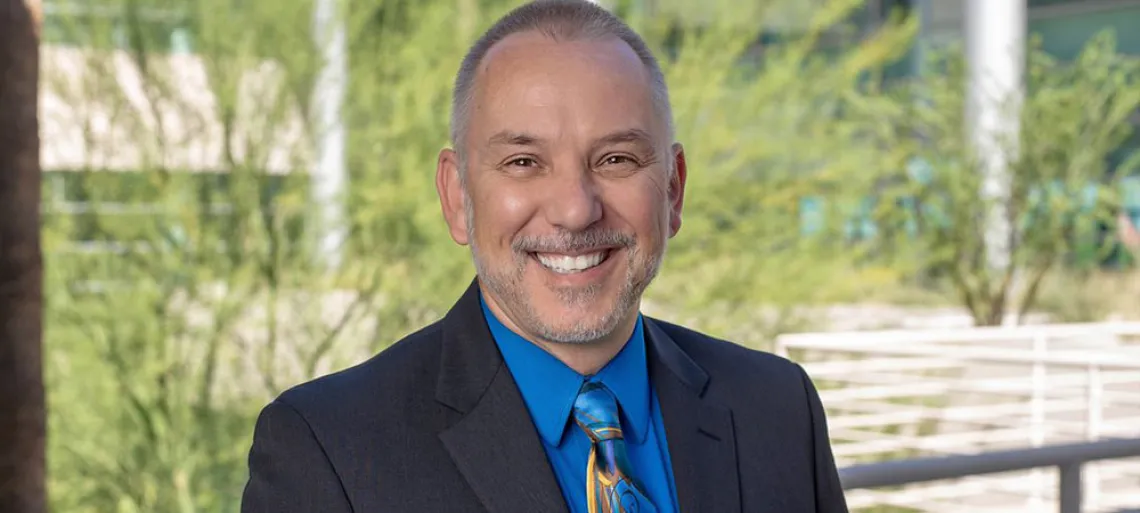Joe Broschak, Associate Professor of Management and Organizations
Seven Questions with Joe Broschak

"What I enjoy most about teaching is making a difference, getting students to pause and say, 'I never thought about that before.' My job is to get students to think about things in a way that changes how they see the world, what their place is in it and what they think is possible in their careers or in their organizations."
What brought you to the Eller College?
After spending the first part of my career at the University of Illinois at Urbana-Champaign, I was looking for a change of scenery. A friend had heard that the management and organizations department (management and policy at the time) had just started a search for a faculty member in organization theory and strategy and suggested I apply. The chance to work with senior faculty whose research I was familiar with and respected (Ken Koput and Keith Provan), and the opportunity to have as a colleague someone who graduated from the same PhD program (Steve Boivie) made the Eller College a very attractive place, and how nice and welcoming the rest of the M&O faculty were made accepting the job offer an easy decision.
How long have you been at Eller?
This year I’m celebrating my 11th anniversary at the Eller College.
What is your current research, and what most excites you about that area of focus?
My research revolves around two broad topics: the structure of organizations and the dynamics of markets. I study a variety of questions about the demographic composition of organizations (differences in men’s and women’s jobs and careers), the employment arrangements in which workers are employed (full-time versus temporary or contractor) and the system of jobs and job titles that individuals hold. About markets, I study the formation and dissolution of client-agency relationships in professional services, patterns of men’s and women’s mobility in managerial labor markets and the effects of innovation on jobs and careers. I have working papers that address questions in several of these areas: Do clients of advertising agencies follow advertising professionals as they move from one advertising agency to another, or do advertising professionals chase clients who switch agencies? Do executives and professionals matter differently to the continuity of client-advertising agency relationships in European and Asian countries compared to the U.S.? Are the idiosyncratic job titles that women in professional service firms hold more precarious than the job titles of men? How does strategic change that affects the market identity of record labels affect the careers of the musicians and technicians that create records?
What excites me about this research is that these are real-life issues we all face--who we work with, what kind of jobs we (and our co-workers) hold, how careers unfold, and how innovation shapes who we work for and the kind of work we do. And by answering these questions we gain insights into how the social world in which we work affects people in real ways--what people experience at work, what they are ultimately able to attain, and how organizations perform. It’s also exciting to be able to link my research with things I saw during my pre-academic career as an engineer and what I observe now in the world around us now.
What are you currently teaching, and what do you most enjoy about teaching?
I’ve taught a number of different things over the years, but most recently I’ve been teaching Introduction to Human Resource Management to undergraduates, Leading Organizational Change to Executive MBA students and--after my experience as executive director of the McGuire Center for Entrepreneurship--I’ve started teaching students and faculty across campus how to design and validate new venture ideas. I’m also teaching Organizational Behavior to students in the Global Business Minor program.
What I enjoy most about teaching is making a difference, getting students to pause and say, “I never thought about that before.” My job is to get students to think about things in a way that changes how they see the world, what their place is in it and what they think is possible in their careers or in their organizations.
How do you bring your research into your teaching?
For undergraduate and master’s students my research dovetails with the kinds of classes I teach. Whenever it’s appropriate I work into my lectures and class discussions findings from some of my studies I’ve done. But because so much of what I study has to do with careers and how organizations are structured, the students and I end up talking quite a bit about their career options and the kinds of organizations they think about working for.
Beyond research and teaching, what are your passions?
Golf, music (both playing and listening), collegiate sports, cooking and learning about wines are probably my biggest passions.
What does the Eller Experience mean to you?
The Eller Experience is all about being highly engaged--in academics, in your career, and in your community. You will get out what you put into it, both now and for the rest of your life. We take “Bear Down” seriously.

